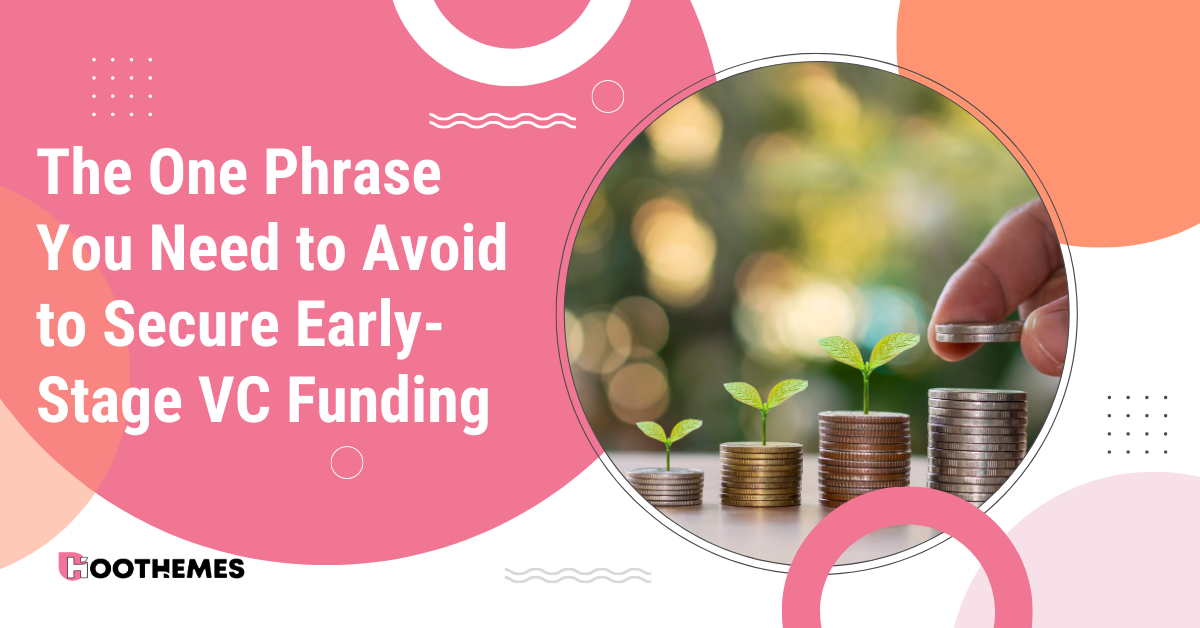Are you an aspiring entrepreneur seeking early-stage VC funding? Well, I hate to break it to you, but there’s one phrase that’s going to make VCs run for the hills – “unproven concept”, even if your startup valuation is still unknown. There is one phrase that used to be the biggest pet peeve for VCs, but it is slowly changing upside down. Definitely, it is not “I am going to be self-sustained soon”.
Let’s first get to the one that makes VCs drool over your venture and want to throw money at you. That’s right, without a proven concept, your chances of securing funding from early-stage VCs are slim to none. It’s no secret that VCs are on the hunt for the next big thing, and they want to invest in startups that have already shown traction and potential for success.
Don’t believe me? Just take a look at the countless articles and blog posts out there that will tell you the same thing. VCs want to see that your idea has been validated by real-world users and can generate revenue.
So, if you want to increase your chances of securing funding, focus on building a solid, proven concept, and launch it as fast as you can to get traction. Show VCs that your idea is more than just a pipe dream, and that it has real-world use and a clear path to generating revenue.
But, let’s be real, even with a proven concept, the odds are still stacked against you. VCs receive hundreds, if not thousands, of pitches every year, and only a select few ever see a dime of funding.
So, why many others are getting rejected? I found that out after pitching to countless VCs in my previous ventures. VCs don’t like your venture to get profitable anytime soon. Their business model is to gain 100% to 1000% return on their money on the lifetime of your startup. How? simple. They must see your venture growing on metrics that do not necessarily translate to profitability but can 10X your valuation for the next rounds. Profitability means not needing them anymore. That is a dangerous word to be heard by them. Their % of the ownership of your venture and your profitability have an opposite correlation. However, they want you to focus on growing metrics (KPIs) such as user signup which may not necessarily mean revenue, or even if they want you to focus on revenue, they would be happy to see you having revenue at loss. Loss means your need. Your need means their ability to lend you more money later and that means their control over you and your venture.
I have to add that the 2022 crash in the market and causing many hyped startups to lose up to 85% of their valuation has changed this mindset in VCs drastically to the point that sequoia capital recently issued their second R.I.P Good Times statement to their portfolio startups asking them to get profitable as fast as they can.
If Not VC Funding then how to Fund an Early Stage Startup?
As an entrepreneur, you know very well that funding is one of the most critical components of success. However, not all funding is created equal, and taking on equity financing can be a difficult decision for many startups. Fortunately, there are many non-dilutive funding sources available to help you fund your startup without giving up equity. Let’s look into alternative funding sources like crowdfunding, grants, angel investors, and etc. While they may not offer the same level of capital as VCs, they can provide the financial boost you need to get your startup off the ground.
Top 10 non-dilutive funding sources for startups
Grants:
Grants are one of the most popular non-dilutive funding sources for startups. These are essentially free money that startups can use to fund their businesses. There are a variety of grants available from government agencies, foundations, and other organizations. Some grants are focused on specific industries, while others are more general.
Crowdfunding:
Crowdfunding is a relatively new form of non-dilutive funding that has become increasingly popular in recent years. This involves raising funds from a large number of individuals via online platforms such as Kickstarter, Indiegogo, and GoFundMe. Crowdfunding is an excellent option for startups that have a strong social media following or a product with a viral component.
Contests and Competitions:
Contests and competitions can be a great way to get exposure for your startup and win funding at the same time. Many organizations host competitions and pitch events where startups can compete for prizes, funding, and even mentorship.
Accelerator and Incubator Programs
Accelerator and incubator programs provide startups with funding, mentorship, and other resources to help them grow and succeed. These programs are typically run by venture capital firms or other investors, and startups are usually required to give up a small amount of equity in exchange for funding and support.
Corporate Sponsorship
Corporate sponsorship is an excellent option for startups that are aligned with a particular company’s mission or values. Many large companies have sponsorship programs that provide funding and other resources to startups in specific industries.
Licensing and Royalties
If your startup has developed a new product or technology, licensing or royalties may be an excellent option for non-dilutive funding. Licensing involves allowing another company to use your technology or product in exchange for a fee, while royalties involve receiving a percentage of the revenue generated from the product or technology.
Customer Financing
Customer financing involves raising funds directly from customers. This can be an excellent option for startups with a loyal customer base or a unique product that has a strong following.
Debt Financing
Debt financing involves taking on loans or lines of credit to fund your startup. While this does involve taking on debt, it can be an excellent option for startups that have a solid business plan and are confident in their ability to repay the loan.
Small Business Administration (SBA)
Loans The Small Business Administration (SBA) offers a variety of loan programs designed to help startups and small businesses. These loans typically have lower interest rates and more flexible repayment terms than traditional bank loans.
Angel Investors
Angel investors are high-net-worth individuals who provide funding to startups in exchange for equity in the company. They typically invest in the early stages of a startup’s growth and often have a personal interest in the success of the business. In addition to providing funding, angel investors can also provide valuable guidance and mentorship to entrepreneurs. Unlike venture capitalists, who typically invest larger sums of money and have more structured investment processes, angel investors can be more flexible and willing to take on higher risk investments. While angel investors can be a great source of funding for startups, it’s important for entrepreneurs to carefully consider the terms of the investment and ensure that they are comfortable with the level of equity they are giving up.
Bootstrapping
Finally, bootstrapping involves funding your startup entirely with your own resources. While this can be challenging, it’s an excellent option for entrepreneurs who are just starting and don’t have access to other funding sources.
In conclusion, there are many non-dilutive funding sources available to startups. Whether you choose to pursue grants, crowdfunding, accelerator programs, or other options, it’s essential to explore all your options and choose the funding sources that are the best fit for your startup’s needs. By doing so, you’ll be well on your way to building a successful business.
In the end, the phrase ” I will be cashflow positive” that no early-stage VC wants to hear may seem daunting, but it shouldn’t deter you from pursuing your entrepreneurial dreams. Just remember, building a solid, proven concept and exploring alternative funding sources can help you secure the funding you need to succeed.









